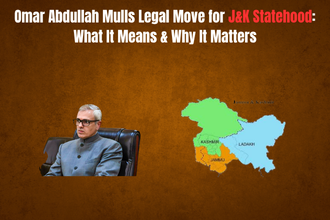In a significant development, the Supreme Court of India has agreed to consider a plea filed by a practising Muslim man, Naushad K.K., seeking a declaration that his inheritance and succession rights be governed by the Indian Succession Act, 1925, rather than Muslim personal law or Shariat. This constitutional petition has ignited fresh debates on personal laws, religious freedom, and uniformity in inheritance laws in India.
Background of the Case: Naushad K.K. v. Union of India
The petition, filed under Article 32 of the Constitution, has been registered as W.P.(C) No. 205/2025. Naushad K.K., appearing in person, argues that his fundamental rights are violated by the exclusion of Muslims from the application of the Indian Succession Act due to Section 58, which limits the Act’s applicability to Christians, Parsis, and Jews while expressly excluding Muslims and Hindus unless they opt in via a formal declaration under specific circumstances.
Naushad contends that he wishes to be governed by secular civil laws rather than religious personal laws in matters of succession, asserting his constitutional right to equality, dignity, and personal liberty.
Bench Observations: A Distinction from Earlier Case
The matter was heard by a bench comprising Chief Justice Sanjiv Khanna and Justice Sanjay Kumar, who noted that a similar matter — Sufiya P.M. v. Union of India — was already pending before the Supreme Court. However, senior advocate Prashant Padmanabhan, appearing for the petitioner in the Sufiya case, clarified that the two matters are fundamentally different.
In Sufiya P.M., the petitioner had renounced Islam and was seeking the application of the Indian Succession Act on that basis. In contrast, Naushad remains a practising Muslim and yet seeks to be governed by secular law, marking a paradigm shift in the nature of the claim.
Challenge to Section 58 of the Indian Succession Act
Both matters indirectly challenge the constitutional validity of Section 58 of the Indian Succession Act, which, in its current form, prevents Muslims from being governed by the Act unless they fall under specific categories, such as marriages registered under the Special Marriage Act.
A Special Leave Petition filed by the Quran Sunnath Society in 2016, challenging Section 58, also remains pending. The current plea by Naushad K.K. might serve to reignite the conversation on uniformity in civil laws and could have far-reaching implications for India’s complex personal law regime.
The Union Government’s Stand So Far
In the Sufiya P.M. case, the Central Government had earlier stated in October 2024 that only Parliament has the authority to decide whether the Indian Succession Act should be extended to Muslims, effectively deferring the responsibility to the legislature. Whether the government will maintain a similar stance in Naushad’s case remains to be seen.
This position reflects the state’s cautious approach in dealing with religious personal laws, particularly in light of the sensitive socio-political implications.
Key Constitutional Issues Raised
The case raises profound constitutional questions, including:
- Can a practising Muslim voluntarily choose to be governed by secular law in matters of succession?
- Does Section 58 of the Indian Succession Act violate Articles 14 (Right to Equality), 21 (Right to Life and Personal Liberty), and 25 (Freedom of Religion)?
- Can the exclusion of an entire religious community from civil law be justified in a secular, democratic republic?
These questions touch on India’s foundational principles, including secularism, the rule of law, and the autonomy of individuals in matters of faith and civil rights.
Personal Autonomy vs Religious Uniformity
Naushad’s plea brings to the fore a clash between personal autonomy and religious uniformity. His argument is rooted in the idea that religious identity should not be the sole determinant for the application of civil laws, especially in areas like inheritance, which affect property and personal relations.
It also reflects a growing sentiment among sections of the Muslim community that current interpretations of Shariat law may not always serve the best interests of individuals, particularly in modern socio-economic contexts.
Uniform Civil Code Debate Rekindled
Though Naushad’s case is not directly seeking a Uniform Civil Code (UCC), it inevitably fuels the national discourse on whether India should have a common set of laws for all citizens in matters like marriage, divorce, and inheritance.
The case might set a precedent for others within the Muslim community who wish to opt out of personal laws for specific legal protections or conveniences available under secular statutes.
Way Forward
The Supreme Court’s decision to hear the plea is significant, not just for Naushad, but for millions of Indian citizens navigating the intersection of faith and law. A favorable ruling could open doors for Muslims seeking to assert individual choice over religious mandates, particularly in civil matters.
However, a ruling against the petitioner could reaffirm the principle that personal laws are binding unless explicitly overridden by statute or constitutional interpretation.
The Court may also choose to refer the matter to a larger constitutional bench, given the far-reaching implications of any judgment on this issue.
Conclusion
The plea filed by Naushad K.K. presents a test case for India’s secular legal framework, probing whether individual citizens can claim civil law protections irrespective of their religious affiliations. The Supreme Court’s decision to entertain the matter signals the judiciary’s willingness to revisit old legal boundaries in light of evolving social norms and constitutional values.
As the legal proceedings unfold, the case will be closely watched by legal scholars, religious organizations, and civil rights activists alike. Whether the court chooses to uphold the traditional divide or leans towards expanding the scope of legal choice in personal matters, the verdict is likely to be a watershed moment in India’s legal and constitutional history.


